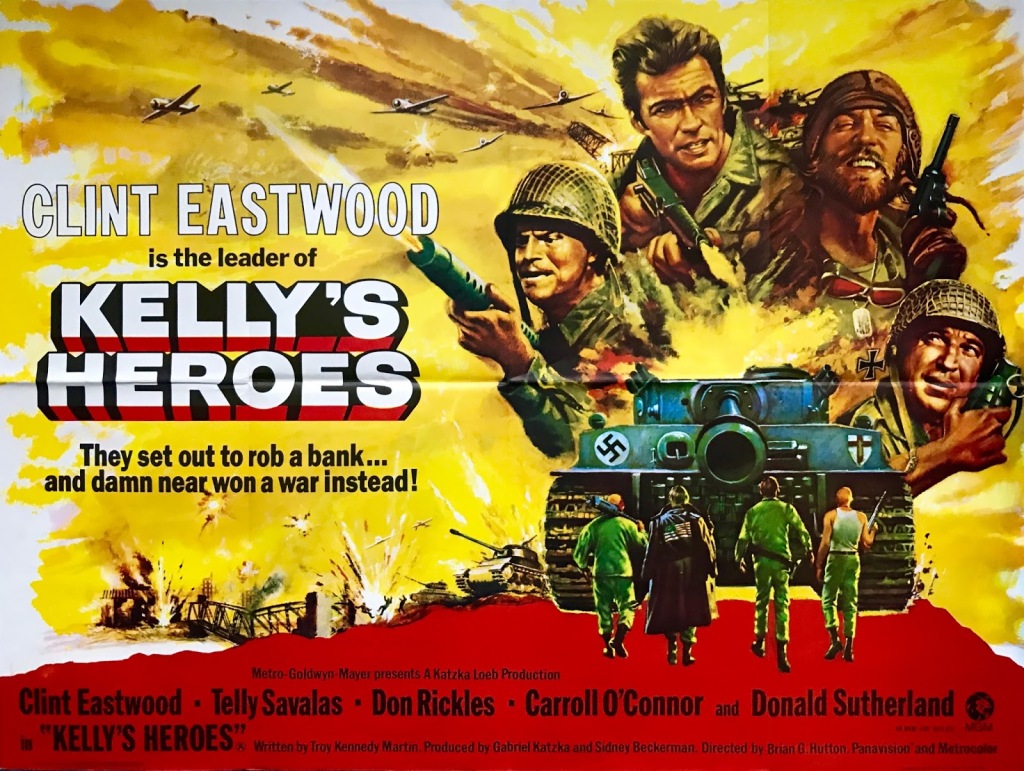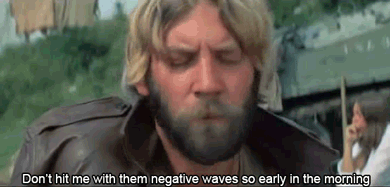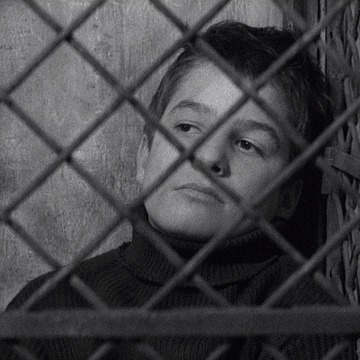
Kelly’s Heroes (1970)
Directed by Brian G. Hutton
Cast includes Clint Eastwood, Telly Savalas, Donald Sutherland, Don Rickles, Carroll O’Connor
Kelly’s Heroes is a marvel of a movie. It’s one of those WWII all star cast movies—like A Bridge Too Far or Battle of the Bulge—with Clint Eastwood, Telly Savalas, Don Rickles, Carroll O’Connor and Donald Sutherland. It’s also one of the WWII caper movies, like The Dirty Dozen or—the absolute best of all this (sub)genre—Where Eagles Dare (1968), also starring Clint Eastwood. It’s a caper/heist movie, of which a number—and some of the best—were made around this period, including The Thomas Crown Affair (1968), The Italian Job (1969), The Hot Rock (1972), and The Sting (1973). As a caper/heist movie, in terms of its cast and its overall tone, it probably mostly closely resembles Ocean’s 11 (1960) and The Hot Rock.
(Caper/heist movies have enjoyed a bit of a surge in popularity in recent years, particularly since 2016. It’s interesting that so many of the best have been remade – from Ocean’s 11 to The Italian Job – and that these remakes are amongst the best made in the 21st Century. But one has to wonder why they didn’t just… rerelease the originals.)
And it is also a Vietnam War movie, a fact which seems to have eluded some critics at the time of its release, as well as some commentators since then, who note the weird anachronistic elements such as Oddball’s (played by Sutherland) clearly hippie nature either without any real thought as to what they might mean, or without fully groking the implications and exploring the impact. The frequent massive major bombardments and explosions were complained of by some critics at the time of the release, again seemingly without any consideration of their role in the film. Unnecessary perhaps in a caper film, sure, and often having no significant or apparent role in the plot per se. But as elements of a Vietnam War movie, all those chaotic, often misdirected bombardments can be seen as clearly serving a role. The chaos, confusion and mindless brutality of war, with humans just scurrying around within it. Very different from the heroic infantry soldier scenes or the Battle of Britain dogfights so popular in more positive depictions of war.
In 1970, the Vietnam War was still very much in progress, and considered as part of the (sub)genre of films critical of that war, Kelly’s Heroes would have to be one of the first, significantly predating films like The Deer Hunter (1978) and Apocalypse Now (1979), though obviously the critique here is indirect, and more at the level of “vibe.” Watching Kelly’s Heroes, it’s hard not to think of it as having been an influence on Apocalypse Now, with people going off mission, going behind enemy lines, caper elements, the band of misfits (including the very young Laurence Fishburne), etc. Oddball has speakers attached to his tank—“We got a loudspeaker here and when we go into battle we play music, very loud. It kind of calms us down.”—and it’s impossible not to think of the “Ride of the Valkyries” scene in Apocalypse Now, hearing that now.
The pointlessness of war, the disaffection of common soldiers, the corruption and incompetence of officers, the waste of lives, prostitutes and substance use, dissolution and rebellion. It’s all there in Kelly’s Heroes—all that’s missing are some officers getting fragged and heroin. Oddball does remark at one point that he hates officers; Crapgame (Rickels) reassures him by noting that Kelly does, too. And the reason for that is Kelly, then an officer himself (a lieutenant), was ordered by his command to attack the wrong hill and ended up killing a bunch of American soldiers. Which is so a Vietnam War anecdote/tragedy.
And I feel pretty confident the filmmakers knew exactly what they were doing. They knew they were making a bizarre, goofy ass chimera of a movie, and they committed to it. It’s a big part of why the movie is so fun, so good. They even throw in some obvious references to Clint Eastwood’s spaghetti westerns—The Good, the Bad and the Ugly came out in 1966—with a bit of music (the soundtrack is by Lalo Shifrin) clearly intended to call up Ennio Morricone’s scores at one point, and the showdown between Kelly, Big Joe (Savalas), Oddball and the German tank commander near the end.
(In looking at the film in relation to Eastwood’s work, it’s perhaps worth noting that Kelly’s Heroes came out only one year after that other bizarre chimera in his filmography, Paint Your Wagon (1969).)
It’s not as pure and tight a war caper film as Where Eagles Dare. It couldn’t be and still be that goofy ass chimera, and—let’s be honest—Eagles is a truly excellent bit of filmmaking. Similarly, it’s not a sustained and focused meditation on the Vietnam War. But I think it has a solid claim to being one of the first major films to start the process of critiquing that war from the perspective of the ordinary grunt.
Obviously, this movie is one of my favorites, and has been since I first saw it as a kid (not sure if that was on TV or at some rep cinema screening—I started going to rep cinemas when I was in elementary school and never looked back). People who know me will not be surprised to learn that it wasn’t Kelly that got me all excited back then, who I bonded with. It was, of course, Oddball
Update: mulling this over, since I wrote it, I’ve become much less convinced of the claim that this is a Vietnam War film in any way. Sure, it’s fairly scathing about the venality and ineptitude of military command, celebrates soldiers disobeying and looking out for themselves, and anachronistically features 60s hippie stuff, but other than the hippie stuff, those critiques of war are not particularly uncommon and not confined to the Vietnam War. (Whether M*A*S*H is more about Korea or Vietnam… I don’t know. The latter I tend to think.) Having a weird hippie tank commander could have been a largely commercial move – appealing to audience sensibilities and adding a lot of lightness. Big Joe and Kelly are, after all, pretty serious the whole way through. But… still something to consider.
For more…
- Kelly’s Heroes on Amazon
- … on Letterboxd
- Kelly’s Heroes (DVD) at San Francisco Public Library
- Kelly’s Heroes download
- Where Eagles Dare trailer
- Where Eagles Dare on Amazon
- Where Eagles Dare (DVD) at San Francisco Public Library
- Where Eagles Dare (book) at San Francisco Public Library
- Where Eagles Dare download
- Heist film on Wikipedia
- Vietnam War films on Wikipedia
Filed under: Movies, caper, Clint Eastwood, comedy, Donald Sutherland, Film, war



